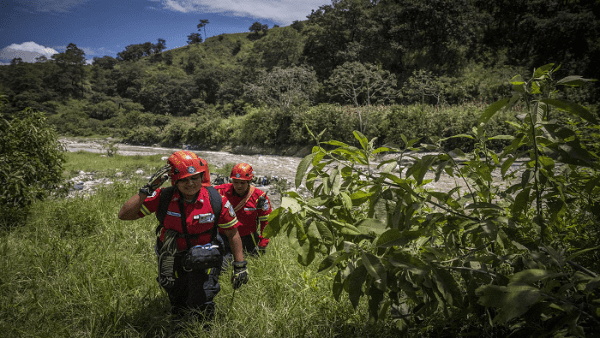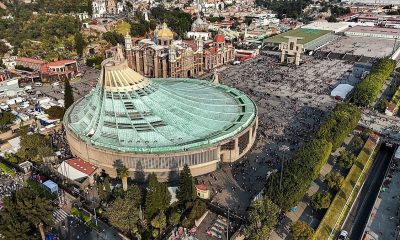Central America
Rains affect more than 4 million people in Guatemala

November 14 |
The National Coordinator for Disaster Reduction (Conred) of Guatemala, said Monday that 67 people died and more than four million people were affected by floods in the most devastating rainy season in recent years.
According to Conred’s report, 15,686 people were at risk due to the intense rains, as well as 23,785 were affected; likewise, 1,717 incidents registered in the national territory were responded to.
The agency’s report also showed that 41,181 people were evacuated and 116,884 were offered assistance, of which 2,108 were taken to State shelters, as well as 13 people were reported missing and seven were reported injured.
According to local reports, rain continued in several Guatemalan states throughout the weekend, following the passage of tropical storm Pilar, and in addition to flooding, landslides were reported.
Conred stated that damages to public infrastructure and housing were reported for a total of 89 schools, 17 bridges totally destroyed and 60 affected, as well as 460 roads affected, five totally destroyed and 29 buildings.
Meanwhile, in the private sector, 1,388 houses are reported to be at risk, 666 with slight damage, 22,570 with moderate damage and 550 with severe damage.
He also indicated in his report that clouds with intermittent rains will prevail during the first days of the week and warned about the approach of a cold front in the Yucatan Peninsula.
For this reason, abundant humidity and cloudiness will enter the northern and central regions of the country, and it is expected that the greatest accumulations of rain will occur in Petén, the Northern Transversal Strip, the Caribbean and the North of the West.
Central America
Honduras election crisis deepens as CNE president denounces intimidation attempts

Tegucigalpa remains engulfed in a deep post-electoral crisis, marked by the absence of final results from the general elections held on November 30. On Thursday, the presiding counselor of the National Electoral Council (CNE), Ana Paola Hall, publicly denounced acts of intimidation that she warned could jeopardize the final phase of the process.
Following a meeting with the G-16+ diplomatic corps, Hall expressed concern over two specific incidents: a call by former president Manuel Zelaya summoning supporters of the Libre Party to gather outside the INFOP facilities—where electoral records and materials are being safeguarded—and a statement issued by the Permanent Commission of Congress accusing her and counselor Cossette López of alleged electoral crimes, an action she described as “baseless and outside their jurisdiction.”
Hall reaffirmed her institutional commitment and warned that she will not allow interference in the announcement of the results. “Honduras comes first,” she emphasized, underscoring her intention to defend the electoral process as a cornerstone of democracy.
Meanwhile, the preliminary results place Nasry ‘Tito’ Asfura, candidate of the National Party, in the lead with 40.52%of the vote, followed closely by Salvador Nasralla of the Liberal Party, with 39.48%. The ruling party’s candidate, Rixi Moncada of Libre, is in third place with 19.29%. Around 0.6% of the tally sheets—many of them showing inconsistencies—have yet to be reviewed.
The Organization of American States (OAS) called an extraordinary session of its Permanent Council to analyze the situation, while civil organizations and governments such as Paraguay’s urged respect for the popular will.
Honduran President Xiomara Castro accused the United States, and specifically former president Donald Trump, of obstructing the process, while also denouncing threats from gangs against voters aligned with her party.
Central America
OAS and EU urge honduran political actors to respect vote results and avoid unrest

The Electoral Observation Missions of the Organization of American States (OAS/EOM) and the European Union (EU EOM) issued an urgent call on Wednesday urging political actors in Honduras to respect the will expressed at the polls on November 30 and to refrain from inciting public disorder while the vote count is being finalized.
Both missions called on candidates, political parties, and authorities to act responsibly and maintain “active vigilance” over the vote-counting process.
So far, the National Electoral Council (CNE) has processed 99.4% of the tally sheets, but 2,773 still show inconsistencies, representing more than 500,000 unverified votes. The electoral body has not set a date for the special review, though it could begin later this week.
“The OAS/EOM reminds that electoral authorities are the only ones empowered to validate the results and reiterates its rejection of any call to disrupt public order,” the mission said in an official statement.
Central America
U.S. finds no evidence of fraud in Honduras election despite delays

The United States government said on Tuesday that it has found no evidence of electoral fraud in Honduras’ presidential election, despite several days of delays in the vote count caused by technical issues.
“We are not aware of any credible evidence supporting a call for annulment,” a State Department spokesperson told EFE in response to complaints over the slow release of official results. Washington emphasized that the elections were monitored by international observers, including representatives from the Organization of American States (OAS), the European Union (EU), and national entities, which it said strengthens the legitimacy of the process.
In the current tally, conservative candidate Nasry “Tito” Asfura—backed by U.S. President Donald Trump—remains in the lead with 1,298,835 votes (40.52%), while his rival, Salvador Nasralla of the Liberal Party, has 1,256,428 votes (39.48%). The difference of 42,407 ballots is based on the latest report from the National Electoral Council (CNE), with 99.40% of the tally completed.
According to the Trump administration, the vote reflects a clear rejection of the governing leftist Libre party, led by outgoing President Xiomara Castro.
“The CNE should certify the election results promptly,” the spokesperson said, urging all political actors to respect the independence of electoral institutions and comply with Honduras’ legal framework.
The vote count—now stretching past four days—has fueled tension and uncertainty among the population. CNE president Ana Paola Hall attributed the delays to unspecified “technical problems.”
-

 International4 days ago
International4 days agoMexico City prepares for 13 million pilgrims at Basilica of Guadalupe
-

 International3 days ago
International3 days agoWashington declares State of Emergency as atmospheric river brings severe flooding
-

 International3 days ago
International3 days agoU.S. to require five-year social media history from tourists under Visa Waiver Program
-

 Central America4 days ago
Central America4 days agoHonduras’ electoral chief reports ongoing technical issues but says results remain intact
-

 Central America4 days ago
Central America4 days agoU.S. accuses Ortega regime of systematic human rights abuses in Nicaragua
-

 Central America4 days ago
Central America4 days agoU.S. finds no evidence of fraud in Honduras election despite delays
-

 International2 days ago
International2 days agoCuba battles out-of-control dengue and chikungunya epidemic as death toll rises to 44
-

 Central America3 days ago
Central America3 days agoOAS and EU urge honduran political actors to respect vote results and avoid unrest
-

 Central America2 days ago
Central America2 days agoHonduras election crisis deepens as CNE president denounces intimidation attempts
-

 International2 days ago
International2 days agoColombia says it would not reject Maduro asylum request as regional tensions escalate
-

 International23 hours ago
International23 hours agoSeveral people shot in attack on Brown University campus
-

 International2 days ago
International2 days agoEcuador on track for record violence as homicides hit highest level in Latin America again
-

 International3 days ago
International3 days agoSix ecuadorian soldiers jailed pending trial for alleged extrajudicial execution
-

 International20 hours ago
International20 hours agoU.S. and Mexico Reach Deal to Address Water Deficit Under 1944 Treaty




































































































